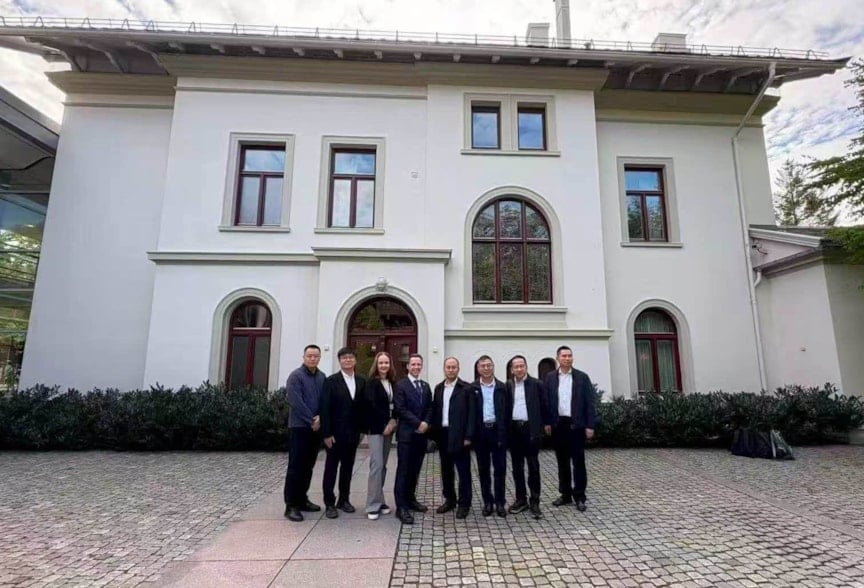Global perspectives on ESG and decarbonization
Shanghai Energy and Carbon Efficiency Center delegates visit DNV’s HQ in Høvik, Norway
We recently welcomed a delegation from the Shanghai Energy and Carbon Efficiency Center to DNV’s headquarters at Høvik, just outside Oslo. Welcomed by Geir Fuglerud, CEO of Supply Chain & Product Assurance at DNV and hosted by Chris Lilholm, Global Head of Sustainability & ESG Services, the visit created a valuable arena for exchanging perspectives on some of the most pressing ESG and decarbonization challenges shaping global business.
The atmosphere was one of genuine curiosity and open dialogue. Delegates raised practical questions, debated scenarios, and reflected on how European regulatory shifts are already influencing industries in China. As one participant noted, “The transition is not just about compliance, it’s about finding the right pathways to remain competitive in a low-carbon economy.”
From metrics to strategy: ESG in practice
The agenda reflected the interconnected nature of ESG, spanning both technical tools and strategic frameworks. Discussions included:
- Life Cycle Assessment (LCA), Environmental Product Declarations (EPD), and Product Carbon Footprints (PCF): With examples of how these are being used in sectors like automotive to map and reduce upstream emissions.
- Value chain decarbonization and Scope 3 emissions: A reminder that corporate climate action depends on collaboration with suppliers and customers, not just internal improvements.
- Carbon Border Adjustment Mechanism (CBAM): Presented by Tone Rice, Head of Section, Sustainability & ESG in Norway, which sparked a lively debate on its implications for industries such as automotive and maritime. One delegate asked: “If a ship is built in China and delivered to a European buyer like Maersk, how will CBAM apply?”
These conversations showed how environmental performance is increasingly tied to governance and financial decision-making, reinforcing ESG as a holistic framework for risk and opportunity management.
ESG dimensions of the dialogue
Several themes emerged that underline how ESG frameworks are evolving globally:
- Environmental: Delegates expressed strong interest in digital carbon accounting platforms, carbon capture and storage (CCS/CCUS), and robust methodologies to assess permanence and effectiveness of climate solutions.
- Social: Scope 3 reductions and value chain initiatives highlight the importance of engaging suppliers, partners, and even customers in shared sustainability goals.
- Governance: Mechanisms like CBAM and the Digital Product Passport (DPP) demonstrate how transparency and accountability are being hardwired into trade and regulation.
The link to sustainable finance was also clear. Delegates emphasized the importance of aligning investments and risk management with credible decarbonization pathways. This reflects a broader global shift: access to capital is increasingly tied to ESG performance and verified reporting.

Maritime focus and beyond
Given DNV’s maritime heritage, it was natural that delegates explored how ESG frameworks apply to environmental performance and stewardship for shipbuilding and shipping. Yet, as the session progressed, it became clear that their interests extended well beyond maritime. The visit underscored that while DNV’s maritime reputation opens doors, our cross-sector expertise in carbon markets, sustainable finance, digital ESG platforms, and product verification is equally relevant for a wider set of sectors and global stakeholders navigating the transition.

Looking ahead
The exchange at DNV’s headquarters in Høvik, Norway, highlighted both the challenges and opportunities of global ESG alignment. Whether addressing the complexities of CBAM, exploring digital solutions for carbon accounting, or considering how financing frameworks can accelerate responsible decarbonization, the discussion reinforced the value of international collaboration.
For businesses, the key takeaway is that ESG is no longer a peripheral issue or a reporting exercise. It is becoming central to competitiveness, trade, and investment decisions. As one delegate reflected at the close of the session, the visit revealed that DNV’s expertise “goes far beyond maritime,” offering a broader lens on how organizations can build resilience and long-term value in the transition to a low-carbon economy.
10/6/2025 9:00:00 AM





